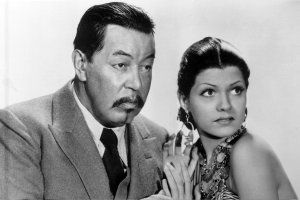
Who under the age of 50 remembers Charlie Chan? Like his more bloodcurdling kinsman, Dr. Fu Manchu, and like Stepin Fetchit, Amos and Andy, and many other racial stereotypes who once populated American novels and movies, he has been politically corrected out of the cultural landscape. It's as though they never existed, like all those vanished commissars erased from photographs in the Stalin era. Charlie Chan was one of the first to go, because he labored under a double onus: he was created by a white mystery writer, Earl Derr Biggers, and he was most famously played in films by Warner Oland, an actor who was not only white but born in Sweden. It was inevitable that Asian-American rights groups would campaign zealously to get Charlie off the shelves and out of the late-night TV movie slot.
So it comes as at least a mild surprise to encounter Yunte Huang's excellent and very sympathetic treatment of the fictional detective in Charlie Chan: The Untold Story of the Honorable Detective and His Rendezvous With American History. A native of China and now a resident of the United States, Huang, though not without some reservations, is fond of Charlie. He points out that, unlike Fu Manchu, Charlie in no way embodied Western fears and suspicions of the Asian world. He may have been a little inscrutable, but more important, he was smart, funny, a good father, an even better detective and, most important, he was the hero of the tales in which he appeared. This was not just a matter of Americans being indulgent. In the heyday of the Charlie Chan films, from the early '30s to the late '40s, he was a huge hit in China. Even Warner Oland, when he toured China, drew clamorous crowds.
You don't need to be a fan of Charlie's to enjoy Huang's narrative, maybe because he's told so many stories here, all of them intriguing.
The origin myth is a little muddy, but the simplest version is that while sitting in the reading room of the New York Public Library, the Ohio-born, Harvard-educated Biggers became fascinated—and inspired—by a newspaper story describing the exploits of a Chinese detective named Chang Apana, who worked for the Honolulu Police Department. Charlie soon appeared as a minor character in the next Biggers novel, but the public demanded more of him. In subsequent Biggers mysteries, Charlie was the star, and a bestselling star at that, so much so that thereafter Biggers was something like Arthur Conan Doyle—chained to his hero whether he liked it or not.
Biggers took generous liberties with Chang Apana's legend. The Honolulu detective was neither fat nor droll—he was, in fact, unable to read English or Chinese, although he was fluent in Hawaiian. But he was colorful—an acrobatic man known for scaling walls and leaping from rooftop to rooftop. His weapon of choice was a bullwhip, with which he corralled gamblers, drug dealers, and especially anyone he caught molesting an animal (his first law-enforcement job was animal protection). A former Hawaiian cowboy, or paniolo, he was always more comfortable in the saddle than in a car (he never learned to drive). Someone once asked Biggers, a man not above using the word "chink" in conversation, why he made Charlie speak in pidgin English ("Advice after mistake is like medicine after dead man's funeral," "Caution very good life insurance"). Biggers said none of his readers would have been interested in a Chinese detective who spoke dully correct English. But it's hard to believe that any fictional character could be much more colorful than the real Apana, whose funeral in 1933 drew one of the largest crowds in Hawaiian history.
All this—the lives of Biggers and Apana, Charlie's career in novels, movies, TV shows, cartoons, and comic books—is told in the context of an America in the throes of nativism. Asian-Americans then were held in the same suspicion and contempt directed today at Arabs and Latinos, a fact that gives this story a lamentable but inescapable currency. In the '20s, when Biggers began the Chan series, the Ku Klux Klan was at the height of its power, Congress was passing the racist Immigration Act of 1924, which established a harsh quota system that limited annual immigration to 2 percent of a nationality's U.S. population and barred some nationalities, mostly Asian, and routinely denied citizenship to many more. Hollywood forbade love scenes between whites and people of color, and Asians were routinely played by whites (Native Americans, in similar fashion, were routinely played by Jews or Hispanics as late as the '60s).
The miracle, then, is that somehow, in the midst of all this, Charlie Chan became an American hero. As Huang notes, "There are stereotypical aspects of Charlie Chan that smack of racial parody and mockery." And yet, there is also something positive about him, something lost if we only concentrate on the crudeness of his portrayal. "Out of the crucible we call art," Huang says, "there is rarely if ever what might be described as good, clean fun." A couple of pages later, he amplifies that statement: "Whether it's a jazzy tune coming from the lips of a blackface Jew or a yellow lie told by a ventriloquist Swede, the resilient artistic flower has blossomed in spite of as well as because of racism. This undeniable fact, insulting and sobering, has uniquely defined America." Or, as Charlie Chan says, "Door of opportunity swing both ways."
Uncommon Knowledge
Newsweek is committed to challenging conventional wisdom and finding connections in the search for common ground.
Newsweek is committed to challenging conventional wisdom and finding connections in the search for common ground.
About the writer
To read how Newsweek uses AI as a newsroom tool, Click here.





